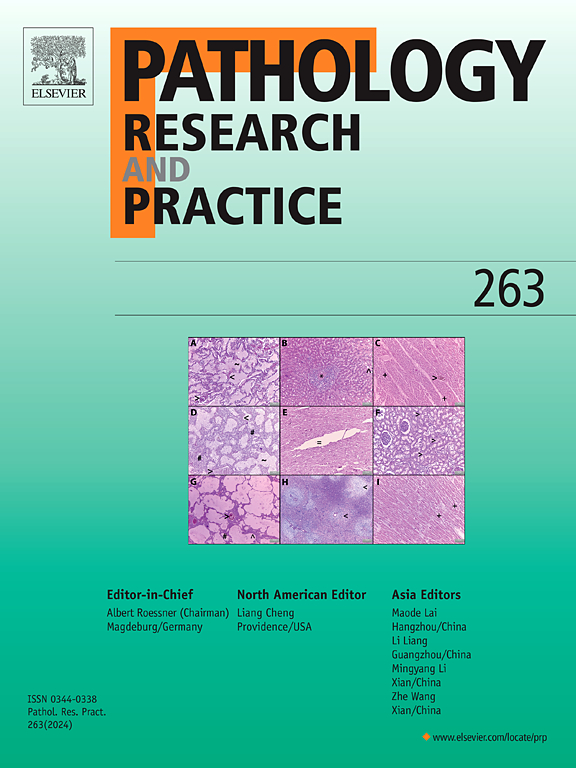Understanding oncobiosis in ovarian cancer: Emerging concepts in tumor progression
IF 2.9
4区 医学
Q2 PATHOLOGY
引用次数: 0
Abstract
Ovarian cancer is a leading cause of gynecologic cancer mortality and has recently been linked to microbial dysbiosis or oncobiosis. Tumorigenesis is a highly complex process, and recent research has revealed numerous new mechanisms showing how tumors interact with their surrounding microenvironment. The inclusion of microbiome studies has significantly advanced this field revealing the important role microbes play, not only in maintaining normal physiological functions of the human body but also in influencing oncogenic pathways. This expanding knowledge is deepening our understanding of tumor pathophysiology and is helping to create new diagnostic, prognostic, therapeutic and preventive strategies for specific cancers. This review explores the role of the microbiome in ovarian carcinogenesis, focusing on its interaction with the tumor microenvironment (TME) and its influence on inflammation, immune regulation and metabolic signaling. This review studied dysbiosis in several anatomical compartments such as the gut, oral cavity, lower and upper genital tracts and ovarian tissues, in relation to ovarian oncobiosis. Emerging clinical implications of these studies include the use of microbial profiles as diagnostic or prognostic biomarkers. Therapeutic strategies such as fecal microbiota transplantation and probiotics are also discussed for their ability to restore microbial balance and enhance treatment efficacy. This review highlights the importance of continued research to explore causal relationships between the microbiome and tumorigenesis, positioning microbiome studies as promising tools in ovarian cancer management and improving patient care.
了解卵巢癌的肿瘤共生:肿瘤进展中的新概念
卵巢癌是妇科癌症死亡率的主要原因,最近已与微生物生态失调或肿瘤共生有关。肿瘤发生是一个高度复杂的过程,最近的研究揭示了肿瘤与周围微环境相互作用的许多新机制。微生物组研究的加入极大地推动了这一领域的发展,揭示了微生物不仅在维持人体正常生理功能方面发挥着重要作用,而且在影响致癌途径方面也发挥着重要作用。这种不断扩展的知识正在加深我们对肿瘤病理生理学的理解,并有助于为特定癌症创造新的诊断、预后、治疗和预防策略。本文综述了微生物组在卵巢癌发生中的作用,重点探讨了其与肿瘤微环境(tumor microenvironment, TME)的相互作用及其对炎症、免疫调节和代谢信号的影响。本文综述了肠道、口腔、下生殖道和上生殖道以及卵巢组织等几个解剖区域的生态失调与卵巢肿瘤的关系。这些研究的新临床意义包括使用微生物谱作为诊断或预后的生物标志物。粪便菌群移植和益生菌等治疗策略也因其恢复微生物平衡和提高治疗效果的能力而被讨论。这篇综述强调了继续研究探索微生物组与肿瘤发生之间因果关系的重要性,将微生物组研究定位为卵巢癌管理和改善患者护理的有前途的工具。
本文章由计算机程序翻译,如有差异,请以英文原文为准。
求助全文
约1分钟内获得全文
求助全文
来源期刊
CiteScore
5.00
自引率
3.60%
发文量
405
审稿时长
24 days
期刊介绍:
Pathology, Research and Practice provides accessible coverage of the most recent developments across the entire field of pathology: Reviews focus on recent progress in pathology, while Comments look at interesting current problems and at hypotheses for future developments in pathology. Original Papers present novel findings on all aspects of general, anatomic and molecular pathology. Rapid Communications inform readers on preliminary findings that may be relevant for further studies and need to be communicated quickly. Teaching Cases look at new aspects or special diagnostic problems of diseases and at case reports relevant for the pathologist''s practice.

 求助内容:
求助内容: 应助结果提醒方式:
应助结果提醒方式:


